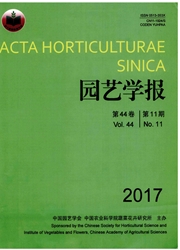

 中文摘要:
中文摘要:
刺角瓜(Cucumis metuliferus)是葫芦科植物中重要的抗根结线虫育种资源。通过同源扩增从刺角瓜中克隆了过氧化物酶(POD)基因(CMPOD),其与黄瓜POD基因的核苷酸相似性达97%。根结线虫侵染刺角瓜后,CMPOD主要在根部组织中表达,表达量呈现先升高后降低的趋势,接种3 d时表达量最高。温度也影响CMPOD的表达,20℃表达量最高,随着温度升高表达量降低。但温度对刺角瓜抗根结线虫作用的影响不显著,在35℃高温下仍表现抗性,证实刺角瓜对南方根结线虫的抗性具有热稳定性。
 英文摘要:
英文摘要:
Cucumis metuliferus is an important breeding resource for resistance to root-knot nematodes in Cucurbitaceae family.Peroxidase gene(CMPOD) was cloned from the CM3 line using primers of homologous sequences.There was 97%nucleotide sequence similarity in POD gene between CM3 and C.sativus '9930'.POD gene mainly expressed in root of CM3 infected by Meloidogyne incognita,and the expression increased at the early stage of nematodes inoculation.POD gene expression reached the highest point at 3 d post inoculation.Moreover,temperature affected the POD gene expression which peaked at 20 ℃.When the temperature was above 20 ℃,POD gene expression reduced but the number of egg masses and galls increased with the rise of temperature.The trend showed a negative correlation between POD gene expression and the number of egg masses and galls.However,the nematode-resistance of CM3 was not compromised with increasing temperature and CM3 still showed resistance at 35 ℃.These results revealed that the root-knot nematodes resistance of CM3 was heat-stable,which could be utilized for crop breeding.Together,our studies provided an important basis to demonstrate the molecular mechanism of nematode-resistance of CM3.
 同期刊论文项目
同期刊论文项目
 同项目期刊论文
同项目期刊论文
 期刊信息
期刊信息
